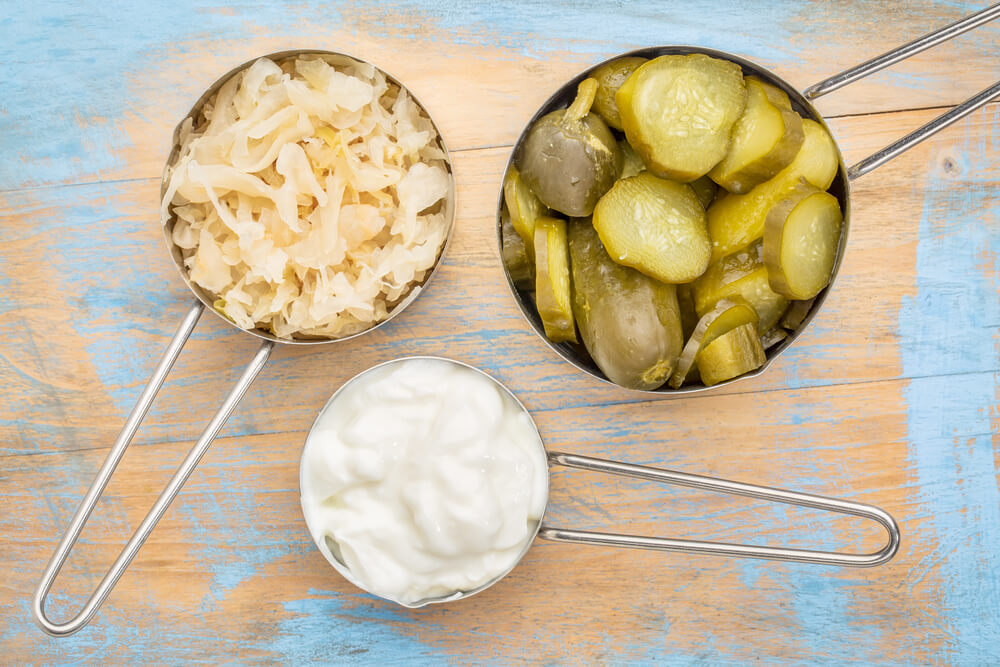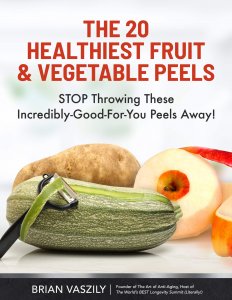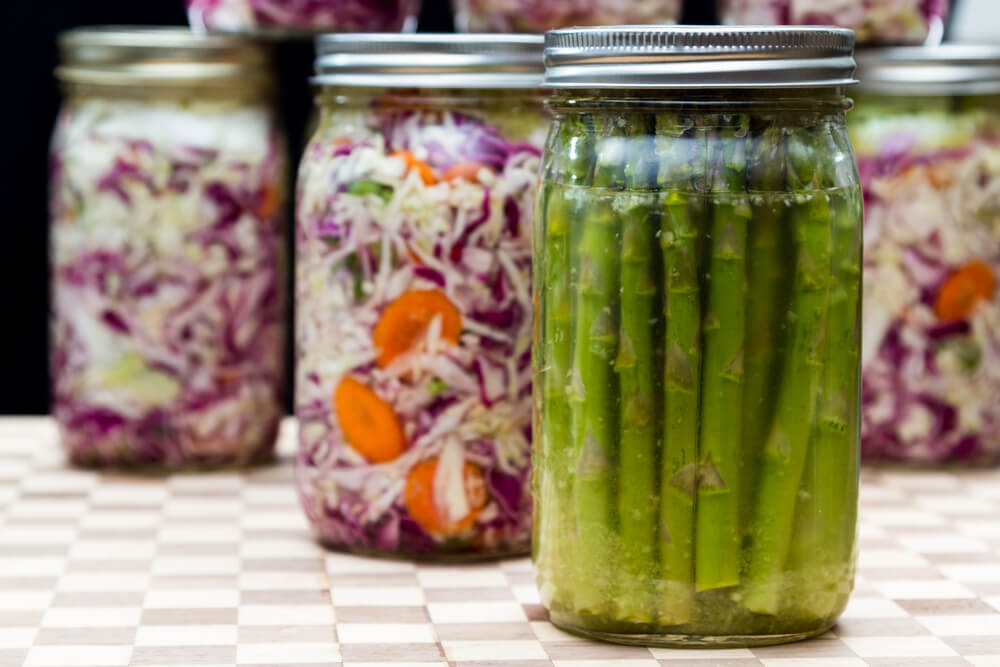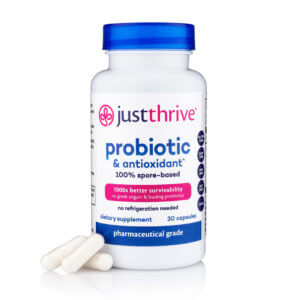Probiotics are at the top of the list when it comes to building up the health of your gut. However, there are many probiotic health benefits that go well beyond your digestive system.
Maintaining (or rebuilding) the right balance of beneficial bacteria and other microorganisms in your body is critical to many facets of your overall health, including immune function, clear skin, and mood. Research is also painting a clear picture of how digestive issues open you up to even more problems (think fatigue, brain fog, skin rashes, etc.).
Probiotics have a clear role to play in resetting the balance in your gut and entire body.
With that in mind, here’s a closer look at probiotics, how they can help you, and the best way to consume them.
What Are Probiotics?
We’re used to hearing the term ‘probiotics’ by now, but what exactly does this refer to?
In general, probiotics are any beneficial microorganisms that are considered helpful in the human body. Most of them are bacteria, but there are also strains of beneficial yeasts, like Saccharomyces boulardii.
The designation ‘probiotic’ sets these microorganisms apart from disease-causing strains- what we might call ‘germs’. In fact, beneficial bacteria are key to keeping potential pathogens from multiplying. (For example, Candida albicans is part of our normal microflora, but an overgrowth can cause a yeast infection.)
While most of us associate probiotics with better digestion, there are many different types. Some do help to digest food, while others play a role in producing vitamins, destroying pathogens, and so on.
Your first introduction to probiotics actually happened at birth. Mothers pass live bacteria to their babies as the newborn passes through the birth canal. This is significant because babies born by cesarean section have very different microflora- usually less varied and with fewer health-promoting strains.
After birth, humans used to get probiotics all the time from both fermented foods and fresh produce harvested from probiotic-rich soil.
Of course, this has all changed now.
Fermentation is no longer necessary for storing food. The use of pesticides and treating produce post-harvest has also cut down drastically on any probiotics we might get naturally. This means you have to be much more intentional about your probiotic intake.
Top Probiotic Health Benefits
Restorative for Your Microbiome

One of the most well-known benefits of probiotics is the effect they have on the microbiome of your body. Remember, you have beneficial microorganisms throughout your entire body, although the gut is often a center of focus because an imbalance there can really wreak havoc.
It’s important to realize that gut health doesn’t mean an absence of pathogens. It’s about a balance between various bacteria, viruses, yeasts, etc.
Too many of one microorganism, and you get disease. Or if you have too few beneficial microbes, the pathogenic ones will get out of control.
This is where probiotics come in. They work to restore proper function by replenishing helpful bacterial strains. This not only provides your gut and body with bacteria that are beneficial, it also keeps the harmful ones from doing damage.
One especially important aspect of this is following antibiotic use. Antibiotics are indiscriminate about which bacteria they kill, so it’s important to load up on restorative probiotics after taking them.
Improves Certain Digestive Disorders
With the restorative effect they have on your gut microbiome, it’s no surprise that probiotics are proving useful for digestive disorders.
They particularly help with one common digestive issue: diarrhea.
Multiple studies have shown that probiotics reduce your risk of antibiotic-related diarrhea. Researchers have called for more studies looking into which probiotic strains help most with different types of antibiotics, but it’s certainly a good reason to take probiotics alongside an antibiotic treatment as well as afterwards.
Other research also shows that probiotics may bring relief for infectious diarrhea. They can reduce the duration of diarrhea by as much as 25 hours and help prevent acute diarrhea.
Another area where probiotic health benefits are extremely promising is for easing irritable bowel syndrome (IBS). Early research indicates that they may be able to improve symptoms like abdominal pain. The same is true for another digestive disorder: ulcerative colitis.
There’s even indication that probiotics can help constipation- another common complaint.
Good for Your Mood and Mental Health

Research has uncovered a definite link between gut health and mental health. That’s not to say all mental disorders stem from poor gut health, but it does highlight the importance of what has been called the gut-brain axis.
This provides the background on why probiotics are proving to be helpful for some symptoms of mental disorders, including depression.
One recent study found that supplementing with probiotics for 8 weeks significantly reduced depression symptoms in participants. Interestingly, they also found that blood levels of glutathione (an important antioxidant) increased with probiotic use, which could indicate that antioxidants may play a role in easing depression.
Other research also indicates improvement of symptoms with probiotic supplementation in other disorders like anxiety, obsessive-compulsive disorder, and autism spectrum disorder.
Again, there is much more research to be done on probiotics and their connection to the brain, but they certainly deserve to be considered as part of a comprehensive treatment for mental health issues.
Gives Your Immune System a Hand
By inhibiting the growth of harmful bacteria, there are some significant probiotic health benefits for your immune system.
As you might expect, much of this starts in your gut. For example, studies have shown that certain strains of probiotics fight bacteria that cause gut infections. This includes E. coli and Listeria, among others.
What may surprise you is how much further these effects go.
Some research indicates that probiotic supplementation can help reduce the frequency and severity of respiratory infections, especially in children. Another study found that a specific probiotic strain, Lactobacillus crispatus, reduced the risk of urinary tract infections in women.
Even above all that, probiotics have been shown to promote the production of natural antibodies. They also may boost natural killer cells and other important immune cells, strengthening overall immunity.
Important for Healthy-Looking Skin

Just like there’s a connection between your gut and your brain, there’s also one between your gut and your skin. And not only does the microflora of your gut affect the health of your skin, your skin also has its very own microbiome that gets “fed” by what you apply to it and what you eat.
Probiotics are likely very important for healthy-looking skin as a whole, but there seems to be a special connection to inflammatory issues like eczema and dermatitis.
As an example, one study found that probiotic-rich milk improved eczema in infants. Another found that the children of women who took probiotics during pregnancy had an 83% less chance of developing eczema than the probiotic-less group.
There’s also evidence that prenatal and postnatal probiotic supplementation may help prevent pediatric dermatitis.
This highlights not only how important a balanced microbiome is for skin health, but also how critical probiotics are during the developmental period.
Supportive of Your Heart
A healthy microbiome isn’t just good for your digestion. It’s also good for your heart.
Research has uncovered a link between specific probiotic strains and both better cholesterol levels and lower blood pressure. Improvements have been “modest” in most studies, but still great enough to make a noticeable difference.
For example, a study that examined the effects of consuming probiotics through yogurt found a 4% decrease in total cholesterol and a 5% decrease in LDL (bad) cholesterol. Not a huge drop but still significant.
Other research has pinpointed Bifidobacterium and Lactobacillus as two probiotic strains that seem to have the most impact on cholesterol. You can specifically look for these strains on the labels of quality supplements and in certain probiotic-rich foods if they list the specific strains on their labels.
Regular probiotic consumption also appears to help reduce blood pressure. Again, the results from studies were moderate but noticeable. Notably, results were seen after probiotics were consumed for at least 8 weeks, so it’s really most effective to make probiotics a part of your daily diet.
May Boost Weight Loss & Weight Management

There have been some significant findings lately about probiotic health benefits for weight loss.
Of course, just taking probiotics alone won’t help you lose a lot of weight, but they are making a case as one of the best supplements to accelerate other weight loss efforts.
To start with, certain types of probiotics (mainly Lactobacillus) help prevent the absorption of dietary fat in your intestine. This means that more of the fat is excreted rather than being stored in your body.
There’s also some evidence that probiotics may help you feel fuller for longer and burn more calories. One specific type, Lactobacillus rhamnosus, helped women in one study lose 50% more weight than those who didn’t take a probiotic. Another, Lactobacillus gasseri, helped reduce belly fat by about 8.5%.
Researchers are still trying to narrow down which probiotics are the best for shedding pounds, but they may become a key part in the future of weight loss.
May Relieve (or Help Prevent) Allergies
Probiotics are on the list of top natural allergy remedies, mainly because they support immune function.
Allergies of all types are related to an overreaction of the immune system. What may be a harmless substance (like pollen, a certain food, dust, etc.) is viewed by your immune system as a threat and steps are taken. These steps involve the familiar symptoms of sneezing, coughing, hives, etc. and can be life-threatening.
It appears that having a healthy gut microbiome (which contributes to immune health) is related to fewer allergies.
This seems to be especially important during the first few months to a year of life. Studies have shown that infants who develop an allergy in the first year or two after birth have what could be considered poorer gut bacteria than those who don’t.
This highlights the importance of probiotics at an early age, but doesn’t mean they can’t be effective later on.
In fact, there’s preliminary evidence that probiotics may be able to help lessen established food allergies- possibly even lactose intolerance. Hopefully, research in this area will continue to turn up results.
May Help Protect Infants from Serious Disease

Once again, we come back to how important probiotic health benefits are from the womb onwards. Not only do they seem to set children up for a healthier life, there’s also indication that they have a protective effect at birth.
This comes from research that found taking high quality probiotics during pregnancy significantly lessened the chance of the baby developing necrotizing enterocolitis (NEC) or neonatal sepsis. Both of these are dangerous diseases and often fatal.
What’s more, probiotic consumption was also associated with overall reduced mortality in the same research review. Probiotics were effective in both breastmilk and formula form, which is very promising.
These findings could particularly be significant for developing countries where these infant diseases are unfortunately common. One study from India found that giving pregnant mothers a synbiotic (combination of probiotic and prebiotic) was highly effective at preventing infant death from sepsis.
Consuming Probiotics: Top Probiotic Foods

Consuming a variety of probiotic foods is an ideal way to get at least part of your daily intake.
Remember, in times past, people would get a wide range of probiotics from various fermented foods and even small amounts of soil attached to produce. It’s best to try and mimic this by routinely eating more than just one fermented product.
Here are some of the popular choices:
- Sauerkraut (be sure to look for traditionally fermented types)
- Kimchi
- Yogurt (and fyi, an increasing range of plant-based yogurts with probiotics are available; try to choose organic/all-natural!)
- Kefir
- Kombucha
- Coconut or water kefir (dairy-free)
- Tempeh
- Miso
- Pickles (be sure to look for traditionally fermented types)
- Kvass
- Natto
Can a Probiotic Supplement Help?
Many people today have a hard time getting enough probiotics from food alone. And, again, the ideal is to routinely consume a range of different probiotic-rich foods in order to get a range of different probiotics — which makes it even more challenging for many people.
Furthermore, many of the studies on probiotic health benefits used high amounts — more than people may typically be able to get from food alone.
For all these reasons and more, many health experts today recommend you consider a high-quality probiotic supplement.
The key word, though, is “high quality.” Probiotic supplements are swarming the market, and it’s safe to say that some if not many are negligible in their potential benefits at best. One of the key reasons, for example, is lack of “absorbability” — because probiotic supplements are consumed by mouth, it is important that they are able to withstand the highly acidic environment of the gastrointestinal tract (i.e., the “stomach acid”.)
The bottom line is that it’s important to research probiotic supplements, including if they provide spore-based delivery or some other natural mechanism to withstand the harsh environment of the gut and actually largely “make it” into the intestines.
Top Recommendation: Just Thrive Probiotic
If you are in the market for a top quality probiotic supplement, Just Thrive Probiotic is one that I personally use after my own extensive research. Just Thrive is a highly effective choice that overcomes the problems I’ve seen many other probiotics have.
As noted above, for example, one of the big challenges with probiotics is getting them to your intestines where they actually do their work. Most supplements start out with a high probiotic amount, but over 90% of the strains may get killed off in the stomach acid. Yes, this even includes some probiotic supplement options that need to be refrigerated (how are they going to survive your body temperature?).
To overcome this problem, Just Thrive Probiotic uses unique and natural spore-based delivery.
The four clinically-based, super probiotic strains essentially go dormant as they pass through the harsh environment of your stomach. Then, they “wake up” at your small intestine and start forming colonies of beneficial bacteria.
I find the results of this new probiotic technology are incredible and noticeable — unlike some other probiotics that don’t seem to do anything.
Learn more about the Just Thrive Probiotic here if interested.




Very interesting, I had no idea that probiotics can help so many issue s
Aren’t those foods you listed actually prebiotic fiber versus the probiotic which is the microorganism?
Hi, see comment back to Anrael. No, the foods listed in the article (such as kimchi, my favorite) are actually rich in the actual range of good bacteria your body needs. Prebiotics are foods that feed the good bacteria in your gut (primarily certain types of fiber).
Sauerkraut, Kimchi and Pickles are in fact both: probiotic and prebiotic. They contain healthy microbes and non digestable carbohydrates. So best of both worlds 🙂
I found this article to be enlightening. I knew about the gut- brain connection, but I did not know that the gut flora affected weight loss and healthy cholesterol levels. Thank you for the probiotic recommendation- I stopped taking them because I read that the stomach acid kills off the beneficial flora before it reaches the intestines. But now I’m thinking of starting probiotics again as another tool to ward off weight gain and statins for high LDL!
Sorry you didn’t include PREbiotics in your article. They work together because Prebiotics actually are great food for the beasties we’re establishing or reestablishing in the gut. Gotta feed them what’s good for us and them.
Prebiotics deserves it’s own article and is forthcoming! In short — get plenty of fiber, as certain types of fiber are outstanding prebiotics (which means they feed the good bacteria, the probiotics, in your body). Some best prebiotic fiber sources? Jerusalem artichokes, onions, leeks, asparagus.
I am with you and use probiotics .
What is traditionally fermented ?
Hi Jennifer, in the context of the article above, “traditionally fermented” means the sauerkraut, pickles, etc are actually fermented. You see, many sauerkraut and pickle brands today are not fermented at all — with non-fermented pickles, they are basically just submerged in hot vinegar, heat processed for shelf life, etc. , and flavored with pickling spices. “Traditionally” basically means the actual old-world way where they are actually allowed to ferment in brine. The fermentation is where the probiotic action is at. MOST common pickle brands, for example, are not fermented. However, because of the growing awareness of fermented foods, those that are fermented often note so on their labels (and you can easily search “fermented pickles” and such online for brands that are… Bubbie’s brand is a good one found in many stores today.)
I think they meant before we the inventions of the fridge or freezer folks use to ferment their food to preserve them by canning them. We don’t have that anymore. We can keep our food from spoiling by freezing or refrigerate it.
hello
for years i’ve been told that while yogurt has many of the organisms needed for gut health, that most are destroyed by the digestive juices and don’t reach the gut……..and that is why we take probiotics on an empty stomach. any comments or corrections to this info?
Hi Naomi, per the end of the article, many strains of bacteria do often die in the harsh environment of the stomach’s juices. However, a) some make it b) some strains (including certain types found in yogurt — see https://www.ncbi.nlm.nih.gov/pmc/articles/PMC1151822/#:~:text=Probiotics%20must%20survive%20in%20the,resistant%20to%20acid%20(51).) are more resistant than others to those juices (whether they are in yogurt, kimchi, supplements etc).
This is why the amount of probiotics is often cited in supplements and sometimes food products (for example, “5 billion CFUs and 5 different probiotic strains.”)
Therefore, when it comes to food, the key is ROUTINELY eating a range of probiotic-rich foods to ensure enough different types or strains of probiotics make it through and get into the gut to do their good deeds.
And that is why, for those considering supplementation, it is especially important to make sure it has a delivery method that gets the probiotics “through” that harsh environment (and also that they survive well sitting on shelves before that point), such as the spore-based method noted in article.
I was told that if taking a probiotic supplement, it’s good to take it at the end of a meal therefore the stomach is less acidic this promise more success with the survival of the probiotic
Does anyone have success with fermenting your own vegetables without using salt?
Search online for “Body Ecology Culture Starter”
You could ferment vegetables with salt. The purpose of salt is to balance the growth of certain strains and prevent the growth of unwanted microbes like mold.
I mixed fermented cabbage with my own organic veggies put it on glass jars in the refrigerator for a week or so. Don’t know if it is perfect, but it is tasty and easy.
Thanks much💐
I drink much kombucha and kefir – just made “bone soup with Soba noodles and fresh veggies!
Really Appreciate Your articles.
Katherine.
Hi thank you for this great article. I have a question though… I always thought that good bacteria derived from food source was termed prebiotic? Probiotic was (is) the actual bacteria that is derived from the consumption of prebiotic foods (which is available to buy in capsule form also these days). Would u mind clarifying? Thank you
Hi Juliet, I clarify this in response to other similar inquiries above. PREbiotic foods mean they contain food that feeds the good bacteria — a.k.a. the probiotics — already in your body. These are typically certain high-fiber foods such as Jerusalem artichokes, onions, and asparagus. The PRObiotic-rich foods in the article above, such as kimchi and fermented sauerkraut, contain a range of the actual good bacteria (probiotics) you need to replenish in your body. Hope that helps!
I love fermented foods but cannot eat many of the foods on your list because I have Interstitial Cystitis and they irritate my bladder. I am also lactose intolerant so that rules out yogurt. My only recourse is probiotic supplements.
Hi Janet
My mom had that same thing. It was really bad for her. She started taking Aloe Vera capsules from desert harvest and it completely went away. It took a bit of time and she still takes them everyday but she is no longer in any discomfort. It was truly amazing.
Just thought I would send that along as I know how painful this can be.
I will love to eat more of femented food, I was diagnosed with colitis a few years ago, and I ended up losing my large bowel. So I will like to know the best probiotic to take.Thank you.
A. Thank you for your Great Articles.
B. WOULD you Please Give a Good Plant Based Recipes for Kimchi and ProBiotic Material which we Can Make it at Home
Thank you In Advance for your Help
Thank you
What to do with two obstacles? First, a sodium restricted diet – most fermented foods are high in sodium. Second, an aversion to the sourness of most fermented foods. I can eat sweet pickle relish, usually added to something else, and am trying to force myself to eat a teaspoon of sauerkraut daily. However, most fermented foods make me gag, and the odor of kimchi makes me want to run out the door. That makes it difficult to consume fermented foods in any kind of relaxed way, whether I particularly like them or not. I cannot take them simply as medicine, because most of them actually repulse me.
If I had an aversion I would buy empty veggie capsules and fill a couple with Kvass (which is basically just the juice from sauerkraut), take a couple of those every day. That way you’re getting it your tummy without tasting it. Hampton’s brine makes good kvass and you could use an eye dropper to fill the capsules.
How about the amount of salt in some the foods you recommend Sauerkraut,
Kimchi, miso, pickles, aren’t they harmful? specially if someone has high blood pressure?
Hi Vahram, there are certain fermented foods that can edge lower in sodium such as kombucha, kefir, and yogurt (though the last two are dairy, for anyone who doesn’t eat or limits those). This is also a case where considering a high quality probiotic supplement (or two, for example to diversify the range of different healthy bacteria etc being consumed) may be especially important.
There is also water kefir which is not dairy based. You can get the culture and instructions for making it from Cultures for Health website. I first learned about water kefir almost 20 years old when I took a class on making water kefir. It enabled me to wean off soft drinks and now I drink mainly water kefir or water with lemon juice. You can also flavor the water kefir if you wish. I usually put several dried organic apricots into my kefir when I am setting up a new batch. Another positive is that the water kefir is ready in 1-3 days depending on the room temperature. Shorter time for higher temperatures.
I agree with Diane. I can’t stand the smell, let alone the taste of kimchi. I’ve tried to eat pickled beets, green beans, asparagus and cauliflower but I can only eat one Tblsp along with other food.
Would I still get the same benefit if I added a fermented food to, say, a stir fry or add some to soup?
Heat would destroy the healthy bacteria.
Maybe you should rely on spore-based probiotic products such as those mentioned in this article.
I greatly appreciated all of your valuable information, I have never took probiotics before by way of pills and the thoughts of eating yogurt & dairy products makes me feel sick and gassy, I don’t have any weight gain issues. I would be interested in learning more about the foods you have mentioned as well as how to prepare, cooking them. 🙏
Thank you for all of your valuable info. I recently learned about you and have purchased your Purity Woods products. My question is about sauerkraut. I did see a homemade recipe on one of the summits, but are there any store brands that can be beneficial?
Interesting point about probiotic strains being destroyed. I eat miso mostly in the winter but am trying to eat it more. I substitute it for salt in some dishes. I have tried making kimchi (once) and sauerkraut a few times but though it is so easy it only worked once so I am taking a class this week at my food coop to improve my success.
In fact, I just ordered 3 bottles of Just Thrive. I would do the 6 month but it has been an expensive year. Maybe next time.
Excellent presentation. Thanks.
Fabulous Article!!! SO well written..,
Had to finish reading before I left.
KD
I have hypothyroid and have read that with hypothyroid one should avoid fermented foods, as well as cruciferous vegetables, as they are goitrogenic. Any comments on that, please?
I take synthroid because of thyroid issues. I do eat fermented foods and most all cruciferous veggies. I wait 4 hours before consuming vitamins, fermented foods, and cruciferous vegetables. cGenerally, I eat the cruciferous vegetables lightly cooked….supposedly better for us thyroid people.
Plus, I have thyroid bloodwork regularly 1-2 times a year. I know my body and test when I have symptoms of low thyroid. This has been a learning experience for me, but it seems to work.
Good luck to you!
I have that too, and read that fermented food strengthen your microbiom, which helps to decrease inflamation. I am fermenting my food (cucumbers, cabbage) at home, eat it daily, feel good. Broccoli, cabbage I eat almost daily too, I just listen to one research doctor, she said that overdosing is not good, like kale smoothly daily, etc. Normal portions don’t hurt you.
thank you for this enlightening article.
very informative and productive article.
Any reason why there is no mention of unpasteurised, traditional, organic apple cider vinegar “with the mother’?
Popular in the UK.
I’m allergic to dairy, soy and grains. Can you tell me if any of these are in your probiotic.
Hi Kathleen – this is Anita from The Art of Anti Aging. In response to your question, below is a note from JustThrive’s team:
No, Just Thrive Probiotic is free from GMOs, gluten, grains, corn, soy, dairy, and histamines.
If you’d like, you can contact our customer support team at support@justthrivehealth.com, they will answer any questions and guide you with the products. OR, you are welcome to call us at 1 (800) 455-8939 or you can even text at +1 (706) 717-6381.
Hi Brian,
Question about Just Thrive Probiotic. Does it contain S. Boulardii?
Also, you mention two of the four probiotics. I would like to know what the other two are.
Some brands offer multiple strains of probiotics. Others, including Just Thrive, offer relatively few.
I’m sure there’s a reason for that. I would like to know what the reason is.
Thank you.
Hi Amrita – thanks for your note. Here is a response from the Just Thrive team:
Just Thrive does not contain S. Boulardii, it contains 4 strains of Bacillus endospores:
— Bacillus Indicus
— Bacillus Clausii
— Bacillus Subtilis
— Bacillus Coagulans
This explains why there are only have 4 strains of bacteria:
https://justthrivehealth.com/blogs/blog/why-your-body-needs-spore-probiotics
Most probiotics do not survive when ingested, like lactobacillus and bifidobacteria found in most probiotic supplements. These bacteria cannot survive the trip from mouth to gut and the bacteria is arriving dead on arrival. Our bacillus strains don’t even come alive until they reach the gut. We have several studies proving the survivability and that our strains actual make a shift in the microbiome within 60-90 days balancing the good and bad bacteria.
If you have any more questions, please feel free to contact their support team at support@justthrivehealth.com, they will answer any questions and guide you with their products. OR, you are welcome to call them at 1 (800) 455-8939 or you can even text them at +1 (706) 717-6381.
Bubbies brand available in health food stores